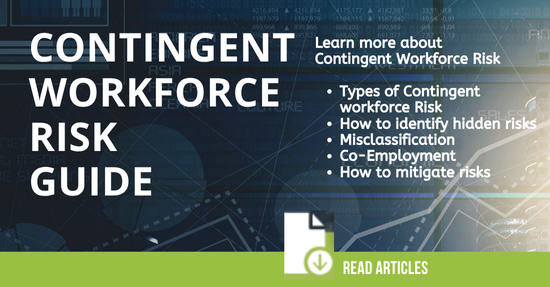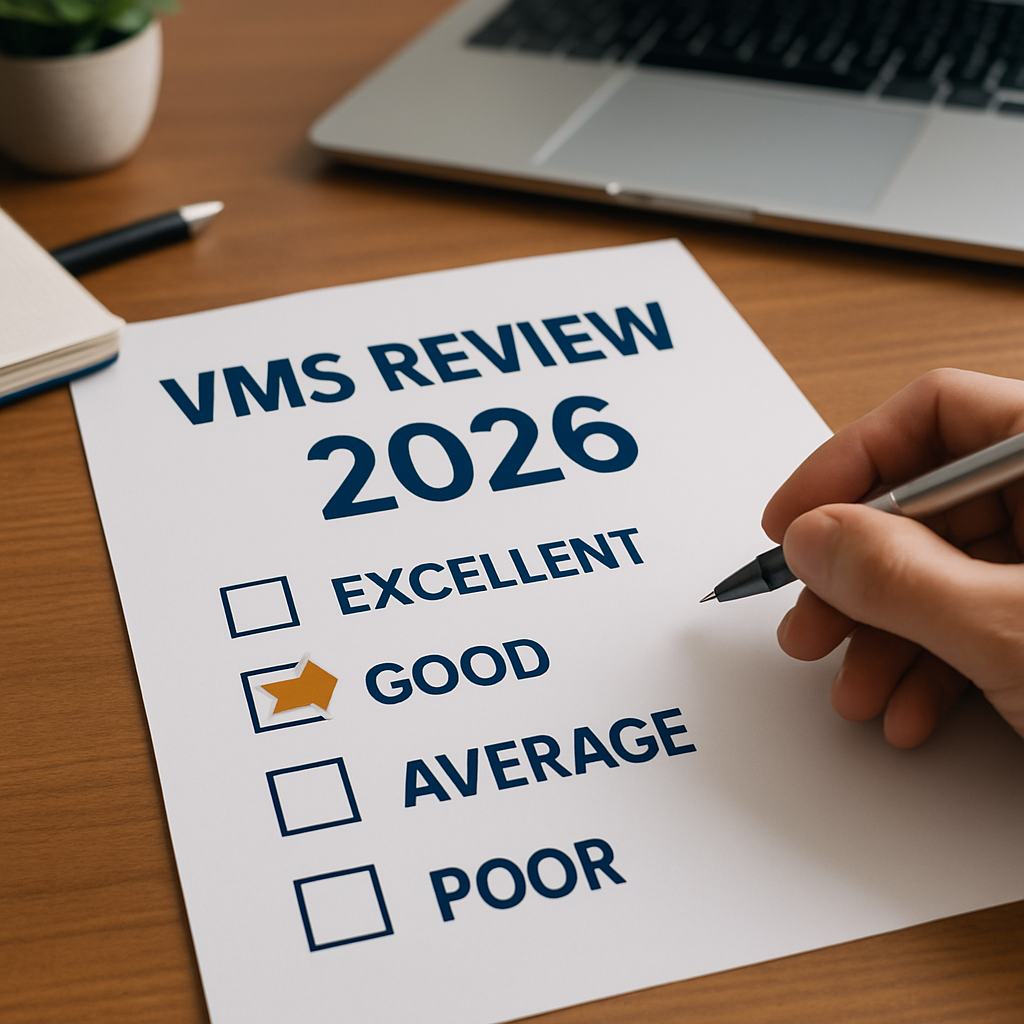While the main attraction of employing contingent workers lies in reducing costs and enhancing workforce quality, allowing hidden risks to persist unchecked can entirely undermine these advantages. In this article, we look at the top contingent workforce compliance risks and the strategies to help you address them.
The contingent workforce is fraught with hidden risks, including unauthorized spending, operational inefficiencies, worker misclassification, and insufficient oversight of staffing agencies. In fact, as shared by SIA in an article on compliance risk, a recent KPMG study reported that 53% of compliance leaders are facing increasing pressure from boards to enhance compliance.
To genuinely benefit your business, it's key to look at the risks associated with managing a contingent workforce and develop strategies to address these risks and boost your organization's profitability.
Here is a list key strategies that will help you mitigate those hidden compliance risks.
What are the hidden risks of a contingent workforce?
The first step to strategizing a successful contingent workforce management program is to identify the areas of risk for your business.
- The misclassification of contingent workers
- No visibility or control over their contingent workforce program
- No standardization of vendor rates across your company’s hiring managers
- Fragmented staffing agency processes across your business, often a result of using a manual spreadsheet to manage your vendors and contingent workers
- The inability to track staffing agency performance
- Hidden costs and rogue spend that goes undetected and staffing agency processes
The two primary risks associated with contingent workforce programs are the misclassification of contingent workers and co-employment. Here are further details on these:
Misclassification Risk
Contingent workers that fall under the independent contractor (IC) umbrella must be considered legal ICs in the region your organization operates - if not, they could be considered employees and your organization could be falling foul of misclassification. Most countries and states will have an online test to help your business ensure it is correctly classifying independent contractors in your contingent workforce program.
Co-Employment Risk
Most businesses use staffing agencies to source and engage their contingent workers. In this relationship the contingent worker is employed by the staffing agency and placed within your organization for a specific period of time as a temp. It’s crucial that you have the procedures and protocols in place for this relationship not to be seen as co-employment, which would essentially mean your business is categorized as a joint employer of the contingent worker - meaning the worker could take legal action against both you and the staffing agency and receive compensation.
Ways to reduce risks associated with a contingent workforce
To assist your business in reducing these risks and enhancing your contingent workforce for optimal outcomes, we have identified five key areas of contingent workforce management that your organization should prioritize.
1 - Centralize data management
Many organizations (especially those with smaller contingent workforce budgets) are still using manual spreadsheets to manage their contingent workforce. Multiple spreadsheets end up getting saved across your business by different hiring managers, data gets stored on emails instead and your business is left with no visibility and control over its contingent workforce. Instead, it’s absolutely crucial you centralize the management of your contingent workforce in one location.
How a VMS helps: A vendor management system will consolidate all vendors and transactions into one centralized, and automated, location. A VMS will also consolidate the entire vendor process. That means automating and centralizing timesheets, improving visibility into non-employee workers, and centralized performance reporting. No matter what data you need to access for your vendors or temporary workers, it will be easy to locate when it is in one centralized location.
2 - Mandate business-wide processes
To ensure all hiring managers are complying with local and national regulations, it’s important that your business mandates business-wide processes within your contingent workforce management program.
How a VMS helps: VMS software allows you to standardize processes across your business, such as where your hiring managers source workers and how much they pay staffing vendors.
3 - Automate your processes
When you manage your contingent workforce processes using manual, time-consuming methods, such as Share Point sites and Excel spreadsheets, you leave room for human error and data miscalculations.
How a VMS helps: A VMS will automate processes such as sourcing, onboarding, time entry and approval, analyzing vendor performance, and payments for accurate insights into your contingent workforce program.
4 - Consolidate vendors in one location
A contingent workforce program involves a number of staffing agencies, and leaves your company with thousands of data points. To use this data strategically and analyze your staffing vendors, it’s crucial that you consolidate all staffing agency data into one centralized location. This will ensure all hiring managers are following standardized rates/agreements and that your business has complete visibility into all staffing agency spend.
How a VMS helps: By consolidating your staffing agencies in one centralized location, your business will be able to seamlessly monitor the performance of your vendors; gain clear visibility and control over vendor relationships and risks; standardized pay rates across all of your hiring managers; as well as automate each process in the vendor relationship lifecycle.
5 - Properly document your contingent workforce data
Incorrectly identifying the relationship between your organization and nontraditional workers can lead to worker misclassification and hefty penalties. That’s why it's important that you properly document all of the information around your contingent workers, ensuring they can’t be classified as full-time employees. Not only does this mitigate the risks associated with misclassification, but proper documentation also improves your visibility into your contingent workforce program.
How a VMS helps: A vendor management system gives you the platform you need to properly document, classify and define your relationship with nontraditional workers. Proper documentation of contingent workers will ensure your business doesn’t incorrectly identify the relationship between them and your organization.
Why Technology Is Key to Contingent Workforce Success
Manual processes and spreadsheets make contingent workforce programs inefficient and risky. A modern Vendor Management System (VMS) like Conexis VMS helps businesses:
-
Gain visibility and control over all contingent labor.
-
Standardize processes across staffing agencies.
-
Ensure compliance with labor and tax regulations.
-
Reduce costs while improving scalability.
Learn more about Contingent Workforce Management
- Contingent Workforce Terms You Need to Know
- Contingent Workforce Management Guide
- Contingent Workforce Stats you need to know
- Contingent Workforce Best Practices
Discover how Conexis VMS can help you manage your Contingent Workforce
Conexis is an award-winning Vendor Management System built for organizations that want the power of enterprise software without the complexity or cost. Built on the latest technology, Conexis delivers the expertise, reliability and security of enterprise systems, while offering the flexibility, user friendliness and tailored, personal service you require. Learn more about our Company and why organizations Choose Conexis VMS.
Why Companies Choose Conexis VMS
Conexis VMS is purpose-built for organizations seeking to manage their contingent labor spend effectively. Here’s why we're the right choice:
- Fast Deployment: Get up and running in weeks, not months
- Transparent Pricing: Flexible pricing with no hidden costs
- White-Label Ready: Customize the platform with your brand
- Real-Time Insights: Make faster decisions with built-in analytics
- Audit-Ready Compliance: Store contracts, worker data, and rates in one secure hub
Looking to Switch Your VMS or Just Getting Started?
Whether you are looking to Switch your VMS, or just Getting Started, we are here to help. Contact Us for a Free No-Obligation Consultation, See how Easy Conexis is to use by taking a quick 2 minute Self-Guided Online Demo, or Book a Personal Demo Today!
Additional articles on the Managing Contingent Workforce Risk: Managing Risk Guide
- Co-Employment Risk: How a VMS Shields you from Risk
- Misclassification: A Critical Risk for Contingent Workforce Programs
- 10 Ways a VMS helps reduce Contingent Workforce Compliance
- How to Identify the Hidden Risks in Your Contingent Workforce Program
- How to Track Contingent Workforce Compliance Risk with a VMS
- What is Contingent Workforce Compliance Risk?
- Is your Staffing Agency putting your company at risk?
- The Benefits and Risks of Hiring Contingent Workers
- The Top 5 Contingent Workforce Risks and How to Manage them
- How a VMS keeps you compliant and audit-ready









